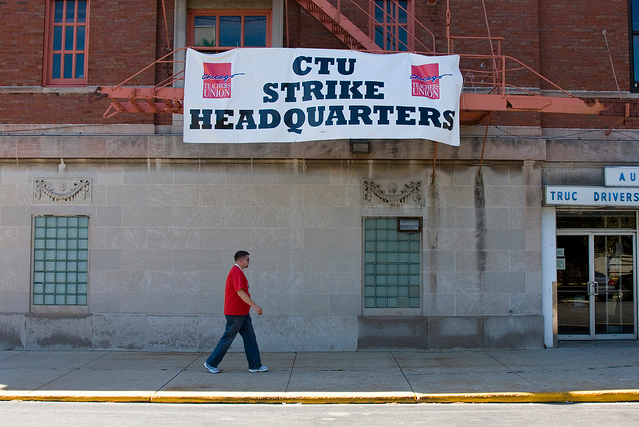Chicago Teachers Strike Day 2: Voters Support CTU; Ald. Austin Comments Lead To Pickets; College Educators Blast Evals Based On Standardized Testing
By Chuck Sudo in News on Sep 11, 2012 10:15PM
- A poll of 500 registered voters conducted for the Sun-Times showed that 47 percent of them support the teachers strike, 39 percent oppose the strike and the remaining percentage was undecided. The poll didn't have very good news for Mayor Rahm Emanuel: only 6 percent of those polled said he was doing an excellent job handling the strike. Mike McKeon of McKeon and Associates, the company that handled the pool, was most impressed by the lack of deviation in support of the strike among racial or ethnic lines, or areas of the city.
- Ald. Carrie Austin (34th) found out up close and personal what democracy looked like after teachers held a picket outside her ward offices Monday because she blamed the strike on Chicago Teachers Union President Karen Lewis. Austin, chair of the City Council Budget Committee, said a strike was "inevitable" because of Lewis's belligerent stance.
"The teachers union is pissed off. They picketed my office. My statement infuriated them, but I still stand by it," Austin said."I think that's what got 'em because I didn't say anything about the mayor or about Jean-Claude [Brizard, schools CEO]. Well, they were never at the table."
Pressed on whether she still believes Lewis was "hell-bent" on a strike, Austin said, "I believed it at the time and I still do....It [the strike] has happened."
- Student turnout at the 147 schools and other sites that were open Monday was low. NBC Chicago reports that less than 5 percent of CPS' 350,000 students attended programs at the schools, library programs and other sites open for students. I wondered if part of the reason for the low turnout was due to parents waking up unaware the strike was called. As I noted yesterday, teachers had to inform the occasional parent hauling his or her child to school that class wasn't in session. Many of those parents were left scrambling for child care after they heard the news. It bears watching as the strike moves forward to see if that number increases.
- I was 16 in 1985, the last year a teachers strike in Chicago affected me: that strike only lasted two days. WBEZ's John R. Schmidt, a former CPS schoolteacher, recounts his days on the picket lines back then. Schmidt recalls feeling like a buck private on the front lines of a war, not unlike what many teachers now are feeling.
That was my last strike. And though I was only a private, I’ll paraphrase a general here — “Strikes are hell.”
- Another schoolteacher, Paul J. Karafiol, looks at the sticking points between CTU and CPS holding up a labor deal. Once again: it isn't the salary, it's the benefits and the unnecessary workload. Here's an example"
Will firing bad teachers produce better educational results?This answer is simple: not unless we’re willing to live with substantially larger classes. An individual school of 50-odd teachers, with good hiring practices and reasonable incentives, can hope to replace three to five poorly performing teachers with teachers whom it expects to do better. (It’s important to remember that even this process is something of a crap shoot: every chair and principal can tell you about the “amazing” candidate who turned out to be anything but.) But there are over 500 Chicago public schools with over 21,000 teachers. Nobody knows how many would be let go under a more rigorous evaluation system.
But if we assume three to five teachers per school, the total comes to about 2,000 teachers in all. Replacing that many teachers is an entirely different task, especially when that number is added to the annual drain of teachers leaving the profession or moving to higher-salaried jobs in the suburbs. The pay difference makes outbound flow of teachers one-way, especially because CPS does not give credit for teaching experience outside the system. In my years hiring teachers in my school’s math department, I always found one or two candidates whom I felt really good about — but never four or five. Do we really think there are several thousand strong teachers who would rush in to replace the ones we let go?
Karafiol's article is one of the more nuanced stories on the strike we've read yet.
- One of the obstacles to a new labor deal is an evaluation system that's weighted toward student performances in standardized testing. A group of university professors and teachers from throughout the Chicago area have signed an open letter to Emanuel, the Chicago School Board and CPS CEO Jean-Claude Brizard blasting this policy. The Chicagoland Researchers and Advocates for Transformative Education (CReATE). CReATE says CPS isn't ready to "implement a teacher-evaluation system based on significant use of 'student growth,'" and argue that there is "no evidence that evaluation systems that incorporate student test scores produce gains in student achievement. In order to determine if there is a relationship, researchers recommend small-scale pilot testing of such systems. Student test scores have not been found to be a strong predictor of the quality of teaching as measured by other instruments or approaches."
-
